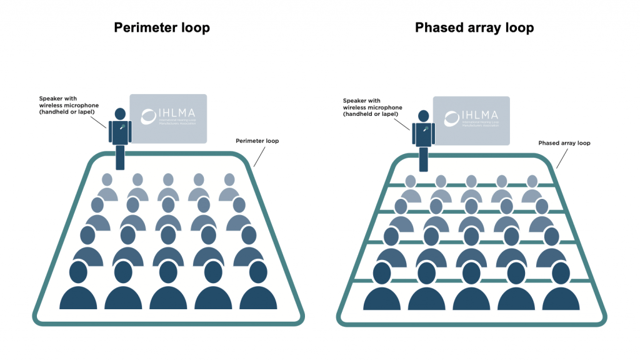Williams AV partnered with the Eugene Airport (EUG) in Oregon to integrate a hearing loop system to better serve the 180,000 travelers with hearing loss who pass through its gates every year.
“Traveling is both exhilarating and challenging, but for those with hearing loss it can be stressful and even dangerous,” said co-chair of The Shedd Institute’s Loop Lane County Committee Sue Prichard, in a statement.
More than 300 million people worldwide experience hearing loss. It affects their everyday actions and abilities and can be the cause of much frustration — especially while traveling. That’s where a hearing loop system comes in.
Hearing Loop Systems Improve Listening for Travelers with Hearing Loss
A hearing loop system is an ideal solution to better communicate with those who experience disabling hearing loss by leveraging an individual’s hearing aid.
But what is it? And, how does it work?
The International Hearing Loop Manufacturer Association (IHLMA) puts it this way:
- An audio frequency induction loop system (AFILS) or hearing loop is used to make communication easier for hearing instrument wearers. It provides a magnetic signal that is picked up by a hearing instrument when this is set to its ‘T’ (Telecoil) setting.
Airports are an excellent candidate for hearing loop systems because of the environment.
Thousands of people filter through airports everyday, creating a buzz and chatter that can make it more difficult for those with hearing challenges to make out speech or important alerts, like flight delays or changes.
However, when those individuals can tap into the hearing loop system, it alleviates confusion and cuts through the noise.
By switching to the “T” setting on their hearing aid, travelers tap into the system directly. Instead of relying on the internal microphone of the hearing aid, listeners pick up the audio from the hearing loop system, which delivers far greater clarity. The IHLMA says this can boost comprehension from roughly 10% to as much as 90%.
“Hearing loops are to hearing aids what ramps are to wheelchairs,” said Prichard. “With their loop installations Eugene Airport removes a major stress barrier and becomes truly accessible to travelers who use hearing devices.”
Choose a Hearing Loop System Fit for the Environment
There are several different applications for hearing loop systems. The various kinds of hearing loop systems are tailored to the environment, function and how people use the space.
Fixed or Counter Loop
Commonly found in banks, reception desks and similar environments, a fixed or counter loop provides hearing assistance to those interacting on a one-to-one basis. At an airport, a hearing loop system like this would work best at the ticket counter — this is how Eugene uses its hearing loop system — but it could also work at restaurants and retail shops.
Portable Loop
Similar to a fixed loop, portable loop systems are also best suited for one-to-one interactions. However, the main difference between the two is the portable system allows for on-the-go use, whereas the fixed remains stationary. When paired with an external microphone used close in proximity to the audio source, portable loops can provide a great listening experience for those with hearing loss.
While seemingly convenient, there can be drawbacks with the portable loop system. They often require batteries, which must remain charged for the best results, and they also require training.
Room Loops
In contrast to the other two kinds of hearing loop systems, room loops appeal to a larger audience. They work best in entertainment venues, houses of worship, classrooms or lecture halls.
The range of room loops can vary, so depending on the environment, listeners who are outside of the room may pick up audio. This should be considered if confidentiality is a concern.
Room loops typically function in one of two ways:
- Perimeter — A wider, more general listening experience in a space.
- Phased array — A more granular listening experience for the audience.

Eugene Airport Proudly Launches its Hearing Loop System
The hearing loop system went live in April 2021, and it was funded by the Telecom Tech Bridge Award — a grant to support innovative technology in Eugene, Oregon.
“Good communication is a basic requirement for creating a positive travel experience for the passengers at the Eugene Airport,” said Acting Eugene Airport Director Cathryn Stephens, A.A.E, in a statement. “We are excited to now have Hearing Loop technology available for our guests at EUG.”
Williams AV has worked with Boeing, Grace Church, Palm Beach County School District, and several others to improve hearing for all. See how Williams AV approaches hearing compliance here.
